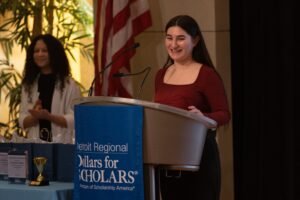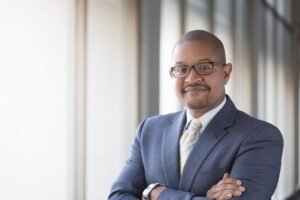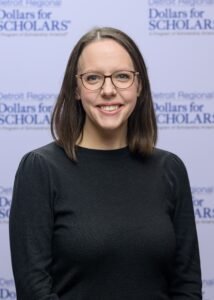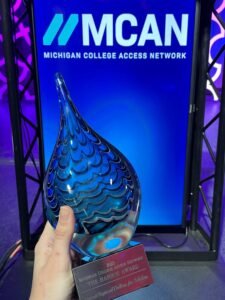by Christa Alessandri-Howley | Jul 9, 2024 | News
Testimonials from first-year college students reveals the impact of DRDFS’ post-secondary support
The goal of Detroit Regional Dollars for Scholars (DRDFS) is to inspire, prepare, and empower students to succeed in life after high school. That goal doesn’t end when a high school student graduates. While DRDFS program participants are empowered and equipped with the skills, knowledge, and resources they need to thrive, the first year a student’s post-secondary journey can be intimidating and isolating.
participants are empowered and equipped with the skills, knowledge, and resources they need to thrive, the first year a student’s post-secondary journey can be intimidating and isolating.
That’s why DRDFS’ Next Level Scholars Program (NLS) features a holistic approach that includes not only extensive preparation, education, and support while in high school, but ongoing support and access to resources to make sure high school graduates are thriving in their post-secondary environments. Inspire, prepare, and succeed encapsulate the DRDFS approach.
Inspire
The first step is to help students see themselves on a post-secondary campus and believe they are capable of accomplishing big things. DRDFS makes it possible for students to explore the options and opportunities available to them, and to begin learning about the financial aid, leadership skills, and admissions requirements that will help them achieve their goals.
Prepare
High school students participate in programming that includes tailored campus visits, post-secondary college application assistance, financial aid education and awareness, etiquette and networking workshops, FAFSA completion, leadership development, and SAT preparation. Each of these elements is designed to break down the academic, social-emotional, and financial barriers to post-secondary success.
Succeed
Student success begins in high school, with growing confidence that comes with new skills, new relationships, and a deeper understanding of what it takes to succeed at the next level. But one of the things that makes DRDFS so remarkable—and so successful—is the extent to which that support endures well after high school graduation. From personal mentoring to financial assistance, to resources designed specifically to meet the needs of students as they begin their lives after high school, the support for DRDFS students is extensive and impactful.
For Amanda Amir, the support she received from DRDFS during her transition to college has benefitted her academically, socially, and even financially. Amanda, a DRDFS NLS student who graduated in 2023 from Stevenson High School in Sterling Heights, speaks passionately about that support, particularly the relationship with her DRDFS post-secondary transition coach.
School in Sterling Heights, speaks passionately about that support, particularly the relationship with her DRDFS post-secondary transition coach.
“Having my DRDFS coach to lean on has been so incredible. I know I can text her at any time. When I was thinking about switching my major and I was super stressed out, she really helped talk me through it. I even took her suggestion and took some summer classes to make sure I didn’t fall behind.”
Amanda, a student at Oakland University, notes that college is very different from high school, especially because she is a first-generation college student. The support from her DRDFS Post-Secondary Transition Coach and other NLS scholars she was able to connect with at Oakland have helped her navigate the new environment and adjust to those differences. Amanda references how the mental health tips DRDFS shares and the college skills book designed specifically for new college students are resources she has been grateful to have in her corner. She even utilized the DRDFS Scholar Success Fund when her car broke down.
“There are so many messages between me and my coach—and I feel so much better about where I am today. I know that it’ll be okay, and if I am struggling, I’ll have her support.”
 Salvador Garcia is a NLS scholar who graduated from Melvindale High School in Allen Park and is currently a business major in University of Detroit-Mercy’s five-year MBA program. Salvador said that ongoing support and regular check-ins with DRDFS are meaningful and extremely helpful.
Salvador Garcia is a NLS scholar who graduated from Melvindale High School in Allen Park and is currently a business major in University of Detroit-Mercy’s five-year MBA program. Salvador said that ongoing support and regular check-ins with DRDFS are meaningful and extremely helpful.
“My DRDFS coach was so fantastic. She was actually the one who first let me know that I had gotten the scholarship I needed to come to Detroit-Mercy. She checked in throughout the year, to ask how classes are going, if I need anything, and just reminding me that the DRDFS team has my back.”
Salvador loved the DRDFS experience in high school, specifically noting the Suited for Success event, the campus visits, and scholarship application help. But the network of NLS post-secondary students and alumni he has been in contact with since being in college has reaffirmed for him that the third pillar of the DRDFS inspire, prepare, succeed approach will continue well into the future.
“When I see the alumni groups and how close their bonds are, it puts me in a great state of mind for the future. When I meet with other alumni from the program, I feel like I will always have someone to relate to—and someone to help me out if I need it.”
Amanda and Salvador’s perspectives highlight the enduring impact of DRDFS and how the program transforms not only college prospects but also makes a lasting difference in students’ lives.
by Christa Alessandri-Howley | Jun 18, 2024 | News
The DRDFS Suited for Success event is a celebration of achievement and a chance for students to prepare to take the next step on their journey
“This event is a huge celebration of these students—an opportunity to show them how many people believe in them and what they are going to accomplish.”
Those are the words of Lyric Bingham, Detroit Regional Dollars for Scholars (DRDFS) Post-Secondary Transition Coach, describing the organization’s Suited for Success event that took place on May 2, 2024, at the Max M. & Marjorie S. Fisher Music Center, home of the Detroit Symphony Orchestra. The event serves as an important milestone in the educational journeys of DRDFS students and gives DRDFS seniors the opportunity to share publicly with peers, friends, and family what their plans are after high school.
For Miranda Alonso, a DRDFS senior from Detroit Cristo Rey High School, those plans include attending Notre Dame and studying finance. Miranda explained how important DRDFS has been in making her college dreams a reality. “Being able to learn so much about so many different colleges and helping me find the best fit has been one of the best aspects of my DRDFS experience,” Miranda said. “I can’t say enough about how this program has been so much more than just something to challenge us academically. For me, DRDFS is about making connections and meeting people and learning skills we can use for the rest of our lives.”
That sentiment resonates with DRDFS Post-Secondary Transition Coach Tania Vega. Like her counterpart, Lyric, Tania sees Suited for Success as a celebration of the students who have come so far and are primed to go on to exciting new challenges. “For me personally, this is my favorite event of the entire year,” said Tania. “I love that it’s focused on the students and their accomplishments. I think it inspires them and it shows them that what they have achieved is a genuinely big deal— and that people care about them and want to help them get where they want to be.”
For Lincoln High School’s Saniya Traylor, that support is palpable and meaningful.
Saniya, who will be enrolling at Grand Valley State University in Allendale, said that “through DRDFS, I’ve had so many people supporting me during my high school journey – from my advisors, from conversations with people in the program, and from tutors who have helped me study for my SAT.”
William Hollins of Clintondale High School values the multiple networking opportunities and college tours he experienced through DRDFS, noting that “one of my top school choices – the University of Toledo – is a place I’d never heard about before getting started on my DRDFS journey.” William expressed gratitude for the unconditional support he has received from DRDFS while in the Next Level Scholars program. “DRDFS supported me by reassuring me that even if I don’t go to college, there are so many post-secondary opportunities out there—and there will be a support system behind me no matter what,” William said.
Communication & Media Arts High School’s Taylar Toodle also enjoyed the college tours and the chance to meet so many people. Taylar noted that having DRDFS’ support has been especially vital this year, when confusion around FAFSA changes raised a lot of tricky financial aid questions for graduating seniors. She will be attending Western Michigan University in the fall, and encouraged those who come after her to take full advantage of everything that DRDFS has to offer. “Be bold! Step outside your comfort zone,” Taylar said. “The experiences and training opportunities you’ll have are so helpful now and will continue to be valuable as we move into the real world.”
Opportunities for Yousif Salim of Adlai E. Stevenson High School in Sterling Heights will come this fall at the University of Detroit-Mercy, where he is entering the school’s six-year business law program. “DRDFS has been a part of my high school journey from day one,” said Yousif. “In fact, it was talking with my counselors that ultimately helped me figure out what I really enjoy and was passionate about. And that was so important in figuring out where to go to college.”
That is music to Tania and Lyric’s ears. Tania was emphatic that DRDFS students should continue to “use the resources available to them, including us!” and encouraged graduates to reach out when and if they need guidance or support.
That is why, for the hundreds of students at the 16 DRDFS partner high schools across Southeast Michigan, and for the long and growing list of program graduates who have gone on to impressive post-high-school accomplishments, Suited for Success is more than just a celebration. It’s a powerful reminder of the personal and institutional support that is available to them as they strive to become the most fulfilled and empowered version of themselves.
by Jill Marecki | Apr 23, 2024 | News
The Free Application for Federal Student Aid (FAFSA), a free form that unlocks access to federal grants, work-study funds, and loans, as well as state and school aid, is a critically important tool for Michigan students who are planning to enroll in college this fall.
tool for Michigan students who are planning to enroll in college this fall.
FAFSA has been making headlines this year, and not necessarily in a positive way. The form has been revamped, under an initiative called Better FAFSA by Federal Student Aid. The overhauled version of the FAFSA is designed to achieve a number of improvements and streamlined features, including a “significant increase in the number of students eligible to receive a Pell Grant.”
In Michigan, nearly 20,000 more students could qualify for the Pell Grant and eligible students could receive up to $27,500 for college through a new Michigan scholarship, just by filling out the FAFSA form. The number of questions has also decreased from more than 100 to under 20. Unfortunately, the rollout of the new form has been plagued with issues, including a months-long delay that has contributed to a 56% decrease in national submissions compared to 2023.
Here’s the good news, however: Despite these hiccups, the FAFSA changes are a positive and much needed update.
With these changes and Michigan’s transformative $24.3 billion school budget signed in 2023, college has the potential to be more accessible and affordable than ever for Michigan graduates.
Despite the delays and frustrations caused by the changes in the form, students and their support system should not get discouraged. They should be keenly focused on completing the FAFSA now and reviewing their submission summary carefully for any errors. We know that high school seniors who complete the FAFSA are 84% more likely to immediately enroll in post-secondary education. Organizations like the National College Attainment Network have been sounding the alarm, urging students, families, schools, and support organizations to prioritize filling out the FAFSA now, otherwise we could be facing a steep decline in post-secondary enrollment this fall.
At Detroit Regional Dollars for Scholars (DRDFS), we are very familiar with the challenges facing today’s students as they work their way through the financial aid process. DRDFS works closely with hundreds of young people across Metro Detroit, we have seen firsthand that with targeted support, including helping students fill out the FAFSA, our students’ dreams of attending college become a reality with the financial aid they unlock after completing the form.
With state investments, there is a 217% increase in financial aid available for state students, according to the Department of Lifelong Education, Advancement, and Potential (MiLEAP). This extraordinary number supports the idea that college has the potential to be the most affordable it has been in recent history. It also reinforces the vital importance of making sure that students overcome the logistical hurdles and fill out the FAFSA.
The impact of that support can be profound. As of March 2024, over 90% of DRDFS seniors have completed the FAFSA with the help of one-on-one support from our coaches, compared to just over 30% of all seniors nationally. Michigan students are counting on us all to help them navigate the process as they prepare for life after high school.
Jill Marecki is the Next Level Scholars Program Director at Detroit Regional Dollars for Scholars.
Originally published in The Detroit News, April 18, 2024
by DRDFS | Mar 4, 2024 | News
AT&T Michigan President David Lewis set to headline DRDFS 11th Annual Celebration Luncheon
 AT&T Michigan President David C. Lewis, Sr. is no stranger to overcoming adversity and making the most of his opportunities. The trailblazing executive has spoken candidly and compellingly about his own story and the transformative power of education and mentorship – as well as the combination of personal initiative and family and community support – that has enabled him to overcome challenges and achieve personal and professional success.
AT&T Michigan President David C. Lewis, Sr. is no stranger to overcoming adversity and making the most of his opportunities. The trailblazing executive has spoken candidly and compellingly about his own story and the transformative power of education and mentorship – as well as the combination of personal initiative and family and community support – that has enabled him to overcome challenges and achieve personal and professional success.
All of which makes him an extraordinary role model for the young people who are a part of the Detroit Regional Dollars for Scholars program – and why it’s such a thrill to have David join the DRDFS team as the keynote speaker for our 11th Annual Celebration Luncheon on March 6, 2024. The event, which will take place at the University of Detroit Mercy, celebrates the more than 100 students in the Next Level Scholars (NLS) Class of 2024 as they graduate from high school and embark on the next step of their educational journey.
David’s address to the students will illuminate how the DRDFS mission connects to his own journey. He will expand on the importance of reaching back while moving forward – and how DRDFS scholars have the opportunity and responsibility to serve as positive examples and leaders for their peers, not just tomorrow, but right now. David plans to share his own inspiring story of success despite the challenges of growing up in a single-parent household in a tough neighborhood, connecting with NLS students about what it takes to overcome similar challenges. All punctuated by inspiring advice from the works of influential black leaders like Cornel West and W.E.B. Du Bois who have been impactful in his own life.
David will also share some of the ways that AT&T is engaged in important work that complements DRDFS initiatives, most notably by bridging the digital divide and connecting communities. That divide – the lack of access to technology and reliable high-speed internet – keeps millions of Americans from having the information they need to thrive. AT&T is making strong efforts to improve access and affordability by expanding its networks and providing more low-cost solutions. These initiatives, along with driving adoption by ensuring digital access for all, are not just admirable, they are essential. Like DRDFS, AT&T’s work empowers young people and elevates not just individuals, but families and communities along the way. For AT&T, connectivity is a bridge to possibility, and the company has stood behind those words through its national commitment to help address the digital divide across the country and in Michigan.
Education. Access. Opportunity. These are key themes in David’s story and in his message that will resonate with every DRDFS student. Through DRDFS and its NLS program, hundreds of students every year across Southeast Michigan have a potentially life-changing opportunity to earn a post-secondary credential and achieve their own goals. The 2024 luncheon event is not just a celebration of that opportunity, but of an important milestone in their own educational journeys. Together, they are crossing a bridge to a future filled with limitless possibilities.
by Jill Marecki | Feb 18, 2024 | News
 Does Michigan value education? For the success of our state, one would hope so, but for years we have heard that the value of a higher education has been called
Does Michigan value education? For the success of our state, one would hope so, but for years we have heard that the value of a higher education has been called
into question. Most recently, Glengariff Group’s survey for the Detroit Regional Chamber reported that only 25% of parents viewed a college education as essential for success.
Regardless of public opinion, the data demonstrates that there is no more significant mechanism for social mobility than a college credential. The Georgetown University Center on Education and the Workforce (CEW) estimates that, by 2031, 72% of jobs will require a post-secondary qualification.
To become a top ten state, we know that Michigan needs more students to pursue and complete post-secondary programs. Rather than focus on the perceived value of a college degree, why not shift our attention to the steps required to make post-secondary success a reality for more students?
Competing Narratives
Many economic, social and political factors shape the public’s opinion of higher education. However, one persistent challenge that complicates the issue is inconsistent messaging.
As their student progresses through school, families receive a range of conflicting advice. Parents are told that four-year institutions are the only viable path to success, only to turn around and hear that students seeking high-paying positions should concentrate on training for a trade.
The truth is that none of these messages need to compete. Skills-based certificates and four-year degrees are both valuable post-secondary credentials. Our role as advocates is to ensure that all students have the information, opportunities, support and resources to attain the qualifications necessary to build rewarding and sustainable careers.
It’s easy to lose sight of the progress that has been made in fostering K-12 to higher education pipelines. But aligning those efforts — and the messages they champion — has never been more critical. Students across our state, in every community, need all of us to work together so that they can understand their options, create a realistic pathway to a good paying career and thrive as they pursue post-secondary attainment.
If we do this, these narratives can be blended into one cohesive plan—a prosperous future where we put students’ interests, needs and desires first and help them find the post-secondary pathway that works for them.
Personal Connections
While broader perception trends provide some insight into the educational landscape, they do not represent the whole picture. Detroit Regional Dollars for Scholars (DRDFS) has long recognized that it is the personal connections and experiences that puts the value in perspective for students.
Campus visits, workshops and college fairs help students imagine themselves at a post-secondary institution — be it two-year, four-year or technical. As the overwhelming majority of students DRDFS works with will be the first in their family to graduate from a post-secondary institution, these types of experiences are particularly impactful.
The results are conclusive. 100% of DRDFS participants graduate high school on time. 87% go on to enroll in post-secondary education within 12 months, against a 49% national average for students from low-income schools.
For organizations like DRDFS, the next challenge is to find ways to amplify these efforts and expand partnerships to scale impact. Initiatives such as the newly established Michigan Department of Lifelong Education, Advancement and Potential (MiLEAP) are a promising start. Aligning efforts from early childhood to career, this department has the potential to change Michigan’s trajectory. One of the three broad goals of the department is to “prioritize community, regional, and state partnerships that help our students succeed.” Partnerships are going to be essential to reach the state’s goal of increasing the number of Michigander’s with a skill certificate or college degree to 60% by 2030. Alignment and partnerships are the key to ensuring students have the personal connections in order to navigate the path through post-secondary education and reach their goals.
A Critical Moment
According to the National Student Clearinghouse, undergraduate enrollment grew 2.1% in fall 2023 — the first increase since the beginning of the pandemic. The appetite for higher education is there. That means we have reached a pivotal moment of opportunity.
Now is the time to listen to our communities, understand the barriers they are experiencing and provide clear, collaborative solutions. When it comes to perceptions around post-secondary education, the data matters. If we hope to change the narrative, though, we must center the voices of communities and programs helping rewrite the script.
Thanks to the work happening across Michigan, we already know many of the strategies that will encourage students to enroll and persist in post-secondary institutions. It will take a concerted, consistent investment at the state level to elevate best practices and pipeline programs to create an inclusive and equitable culture that demonstrates the impact that higher education can have for each student, family and community.
by Christa Alessandri-Howley | Dec 19, 2023 | News
Receiving the inaugural MCAN Harbor Award is a validation of DRDFS’ mission—and an inspiring opportunity to connect with groups that share similar goals and ideals
 The Michigan College Access Network (MCAN) is a leading organization in Michigan’s college access movement. The organization has done great work to improve the futures of Michigan’s students and communities by making college more accessible. Their work is not just consistent with the DRDFS mission, it also represents an inspirational example of what the broader community can accomplish collectively in support of the young people who will make an enduring positive impact on Michigan’s future.
The Michigan College Access Network (MCAN) is a leading organization in Michigan’s college access movement. The organization has done great work to improve the futures of Michigan’s students and communities by making college more accessible. Their work is not just consistent with the DRDFS mission, it also represents an inspirational example of what the broader community can accomplish collectively in support of the young people who will make an enduring positive impact on Michigan’s future.
Last month, DRDFS was honored to receive MCAN’s first-ever Harbor Award, presented to an organization that has significantly contributed to the college access field through direct service in its community. The award was presented at the College Access Impact Awards, MCAN’s annual event honoring “the individuals and organizations who have made extraordinary efforts to improve postsecondary attainment in Michigan, especially among low-income students, first-generation college-going students and students of color.”
“DRDFS shares our vision of providing equitable opportunities for students to earn a post-secondary credential, reach their career goals, and strengthen their communities,” said Ryan Fewins-Bliss, MCAN executive director. “We are proud to honor DRDFS’ work with the inaugural Harbor Award.”
The College Access Impact Awards program has recognized more than 100 people and organizations since the awards began in 2015. DRDFS was one of 13 individuals and organizations honored at the 2023 event, which was held in Mount Pleasant. To be recognized alongside so many individuals and organizations doing such extraordinary and admirable work was a memorable and rewarding experience.
 After more than 30 years of serving Southeast Michigan students, this is a noteworthy moment for DRDFS: an important step for a grassroots organization that continues to grow and make an increasingly significant impact. The MCAN Harbor Award is also a distinct honor specifically because of the award’s focus on and recognition of community impact.
After more than 30 years of serving Southeast Michigan students, this is a noteworthy moment for DRDFS: an important step for a grassroots organization that continues to grow and make an increasingly significant impact. The MCAN Harbor Award is also a distinct honor specifically because of the award’s focus on and recognition of community impact.
DRDFS is part of a larger community that extends across Southeast Michigan. There are so many hardworking and inspiring people who support the organization. From high school advisors and principals to the DRDFS alumni who come back to talk to students, DRDFS truly does rely on the hard work, involvement, and support of so many. DRDFS was founded to address a need in the community, and community and connectivity remain at the core of that mission and at the heart of the DRDFS organizational identity.
“We feel so fortunate to be a part of this important time in our students’ lives,” said Christa Funk, DRDFS executive director. “Students across our state, in every community, need all of us to keep being that harbor: a place to belong and a place where every student can thrive as they pursue post-secondary attainment. We look forward to continuing our work to help them make their goals a reality.”
 participants are empowered and equipped with the skills, knowledge, and resources they need to thrive, the first year a student’s post-secondary journey can be intimidating and isolating.
participants are empowered and equipped with the skills, knowledge, and resources they need to thrive, the first year a student’s post-secondary journey can be intimidating and isolating. School in Sterling Heights, speaks passionately about that support, particularly the relationship with her DRDFS post-secondary transition coach.
School in Sterling Heights, speaks passionately about that support, particularly the relationship with her DRDFS post-secondary transition coach. Salvador Garcia is a NLS scholar who graduated from Melvindale High School in Allen Park and is currently a business major in University of Detroit-Mercy’s five-year MBA program. Salvador said that ongoing support and regular check-ins with DRDFS are meaningful and extremely helpful.
Salvador Garcia is a NLS scholar who graduated from Melvindale High School in Allen Park and is currently a business major in University of Detroit-Mercy’s five-year MBA program. Salvador said that ongoing support and regular check-ins with DRDFS are meaningful and extremely helpful.
 tool for Michigan students who are planning to enroll in college this fall.
tool for Michigan students who are planning to enroll in college this fall. AT&T Michigan President David C. Lewis, Sr. is no stranger to overcoming adversity and making the most of his opportunities. The trailblazing executive has spoken candidly and compellingly about his own story and the transformative power of education and mentorship – as well as the combination of personal initiative and family and community support – that has enabled him to overcome challenges and achieve personal and professional success.
AT&T Michigan President David C. Lewis, Sr. is no stranger to overcoming adversity and making the most of his opportunities. The trailblazing executive has spoken candidly and compellingly about his own story and the transformative power of education and mentorship – as well as the combination of personal initiative and family and community support – that has enabled him to overcome challenges and achieve personal and professional success. Does Michigan value education? For the success of our state, one would hope so, but for years we have heard that the value of a higher education has been called
Does Michigan value education? For the success of our state, one would hope so, but for years we have heard that the value of a higher education has been called The Michigan College Access Network (MCAN) is a leading organization in Michigan’s college access movement. The organization has done great work to improve the futures of Michigan’s students and communities by making college more accessible. Their work is not just consistent with the DRDFS mission, it also represents an inspirational example of what the broader community can accomplish collectively in support of the young people who will make an enduring positive impact on Michigan’s future.
The Michigan College Access Network (MCAN) is a leading organization in Michigan’s college access movement. The organization has done great work to improve the futures of Michigan’s students and communities by making college more accessible. Their work is not just consistent with the DRDFS mission, it also represents an inspirational example of what the broader community can accomplish collectively in support of the young people who will make an enduring positive impact on Michigan’s future.
 After more than 30 years of serving Southeast Michigan students, this is a noteworthy moment for DRDFS: an important step for a grassroots organization that continues to grow and make an increasingly significant impact. The MCAN Harbor Award is also a distinct honor specifically because of the award’s focus on and recognition of community impact.
After more than 30 years of serving Southeast Michigan students, this is a noteworthy moment for DRDFS: an important step for a grassroots organization that continues to grow and make an increasingly significant impact. The MCAN Harbor Award is also a distinct honor specifically because of the award’s focus on and recognition of community impact. “I grew up without a clue of what I wanted to do, or where I wanted to go in life, until I had the opportunity to join Dollars for Scholars my sophomore year of high school. From visiting campuses, to SAT prep, the guidance I received from the program changed my entire outlook.
“I grew up without a clue of what I wanted to do, or where I wanted to go in life, until I had the opportunity to join Dollars for Scholars my sophomore year of high school. From visiting campuses, to SAT prep, the guidance I received from the program changed my entire outlook. “From college tours to financial aid, Dollars for Scholars has greatly impacted my path to higher education. As a first generation college student, deciding where I would want to continue my education and figuring out how I would get there was a difficult process. My family and I lacked the time and transportation necessary to visit schools, and this limited me in figuring out my future.
“From college tours to financial aid, Dollars for Scholars has greatly impacted my path to higher education. As a first generation college student, deciding where I would want to continue my education and figuring out how I would get there was a difficult process. My family and I lacked the time and transportation necessary to visit schools, and this limited me in figuring out my future. “When joining Dollars for Scholars, I was eager to visit colleges and earn scholarship money. Being able to look at all the different schools with other students I could relate to was so reassuring. Dollars for Scholars was able to answer my questions about the ins & outs of post-secondary education, as well assist me with applications. This extra help was so motivating.
“When joining Dollars for Scholars, I was eager to visit colleges and earn scholarship money. Being able to look at all the different schools with other students I could relate to was so reassuring. Dollars for Scholars was able to answer my questions about the ins & outs of post-secondary education, as well assist me with applications. This extra help was so motivating. “Detroit Regional Dollars for Scholars is a life-changing program. Before high school, I was going down a path that if most kids took, they’d end up either dropping out of school or going to jail. Detroit Regional Dollars for Scholars helped inspire me to get on a better path by showing me how to prepare for college. Hearing other students’ stories made me feel like I could be successful both in high school and post-secondary education.
“Detroit Regional Dollars for Scholars is a life-changing program. Before high school, I was going down a path that if most kids took, they’d end up either dropping out of school or going to jail. Detroit Regional Dollars for Scholars helped inspire me to get on a better path by showing me how to prepare for college. Hearing other students’ stories made me feel like I could be successful both in high school and post-secondary education.